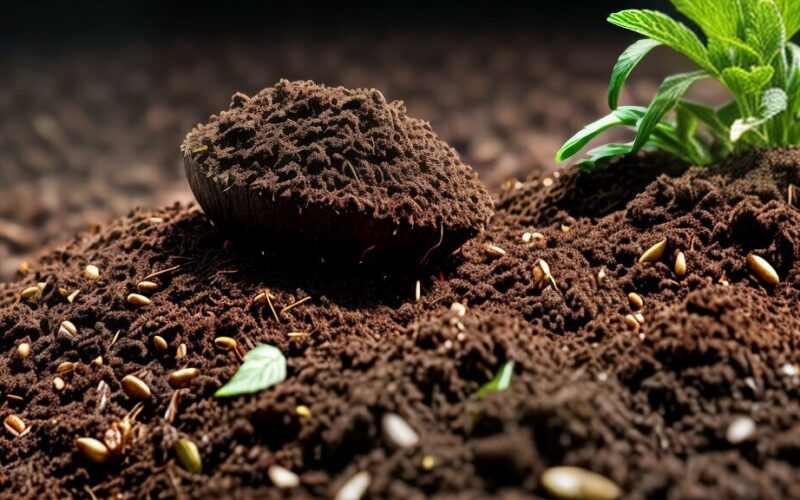Are you wondering if your compost pile is supposed to have an odor? The answer is yes. Compost is a natural process that involves the breakdown of organic materials, and it is normal for it to emit a certain degree of odor. However, not all compost smells are created equal, and some may be more unpleasant than others.
In this section, we will explore why compost smells, what odors are normal, and how to manage and reduce unpleasant smells. By understanding more about compost odors, you can ensure a healthy and successful composting process.
Key Takeaways:
- Compost is supposed to have an odor
- Not all compost odors are created equal
- Understanding compost odors is crucial for managing and reducing unpleasant smells
Understanding Compost Odors
If you’ve ever wondered why your compost smells, it’s important to understand the natural decomposition process that occurs in compost piles. As the microorganisms in the pile break down organic matter, they produce gases and heat, which can cause different odors to arise.
Common smells associated with composting include an earthy, musty scent, as well as hints of ammonia and sulfur. These odors are typically considered normal and signal that the compost is progressing as it should.
However, some odors may indicate potential issues with your compost pile. For example, a strong, putrid odor could be a sign of excessive moisture, while a sour odor may indicate a lack of oxygen in the pile. It’s important to understand the difference between normal and abnormal compost odors in order to assess the health of your compost.
Factors that Affect Compost Smell
Several factors can impact the smell of your compost pile. The most significant is the carbon-to-nitrogen (C:N) ratio, which affects the rate of decomposition and the types of microorganisms present in the pile. If the ratio is too high in nitrogen, the compost may have a strong ammonia odor. If the ratio is too high in carbon, the pile may decompose too slowly and emit a musty odor.
The materials you add to your compost pile can also affect the smell. For example, adding too many citrus peels or other acidic materials can cause a sour odor. Meat, dairy, and fatty foods can attract pests and create unpleasant smells if not managed properly. It’s important to balance your compost materials to avoid these odors.
Lastly, the amount of moisture in your compost pile can impact the smell. Too little water can slow down decomposition, while too much water can create a putrid odor. Maintaining the proper moisture level in your compost pile is important for managing odors.
Normal vs. Abnormal Odors in Compost
As you begin composting, you may notice various smells coming from your compost pile. Don’t worry; compost is supposed to have a smell. In fact, the decomposition process produces various odors as organic matter breaks down into nutrient-rich soil. However, it’s essential to distinguish between normal and abnormal compost odors to determine the health of your compost.
Normal compost odors typically include earthy, musty, or grassy smells, which are signs that beneficial microorganisms are breaking down organic matter. These smells should be mild and fade after a few days of aeration.
Abnormal compost odors, on the other hand, can indicate problems with your compost pile. For example, a strong ammonia smell could mean that your compost has too much nitrogen, while a putrid, rotten egg smell could be a sign of excess sulfur. A sharp, acidic scent could suggest that your compost is too acidic, while a sour or rancid smell may indicate a lack of oxygen. If you notice any of these abnormal odors, it’s important to address them to maintain the health of your compost pile.
| Normal Odors | Abnormal Odors |
|---|---|
| Earthy | Ammonia |
| Grassy | Rotten egg |
| Musty | Sharp, acidic |
Image source: 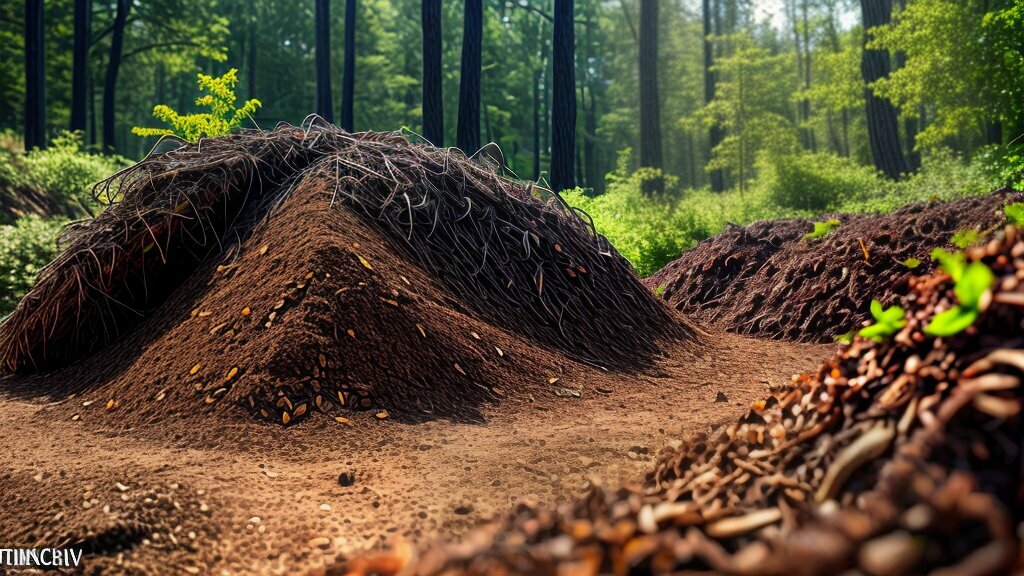
By identifying normal and abnormal compost odors, you can evaluate the health of your compost pile and address any potential issues. Remember that managing compost odors is an ongoing process that requires attention to moisture levels, aeration, and the balance of carbon and nitrogen-rich materials. In the next section, we’ll explore effective strategies for managing compost odors and maintaining a healthy compost pile.
Managing Compost Odor
Compost odor can be a nuisance, but with the right techniques, you can effectively manage it. Here are some tips:
- Proper aeration: Lack of oxygen in the compost pile can cause anaerobic bacteria to thrive, producing unpleasant smells. Use a pitchfork or aerator tool to turn the pile regularly, allowing air to circulate.
- Carbon-to-nitrogen ratio: Too much nitrogen-rich material (such as fresh grass clippings) in the pile can cause a pungent odor. Aim for a 25-30:1 ratio of carbon-rich (e.g., leaves, straw) to nitrogen-rich materials.
- Odor-absorbing materials: Add odor-absorbing materials such as dry leaves, straw, or wood chips to the compost pile to help neutralize odors.
- Moisture control: Excessive moisture in the compost pile can lead to anaerobic conditions and unpleasant smells. Ensure the pile stays moist, but not too wet. A good rule of thumb is that the compost should feel like a damp sponge.
If you are experiencing persistent odor problems, consider troubleshooting potential issues:
| Potential Issue | Possible Solution |
|---|---|
| Excessive moisture | Add more dry, carbon-rich materials and ensure proper aeration |
| Not enough oxygen | Turn the pile frequently to increase airflow |
| Improper materials | Avoid adding meat, dairy, and oily foods to the compost pile as they can cause unpleasant odors and attract pests. |
By following these tips and troubleshooting potential issues, you can effectively manage compost odor and create a healthy, nutrient-rich compost for your garden.
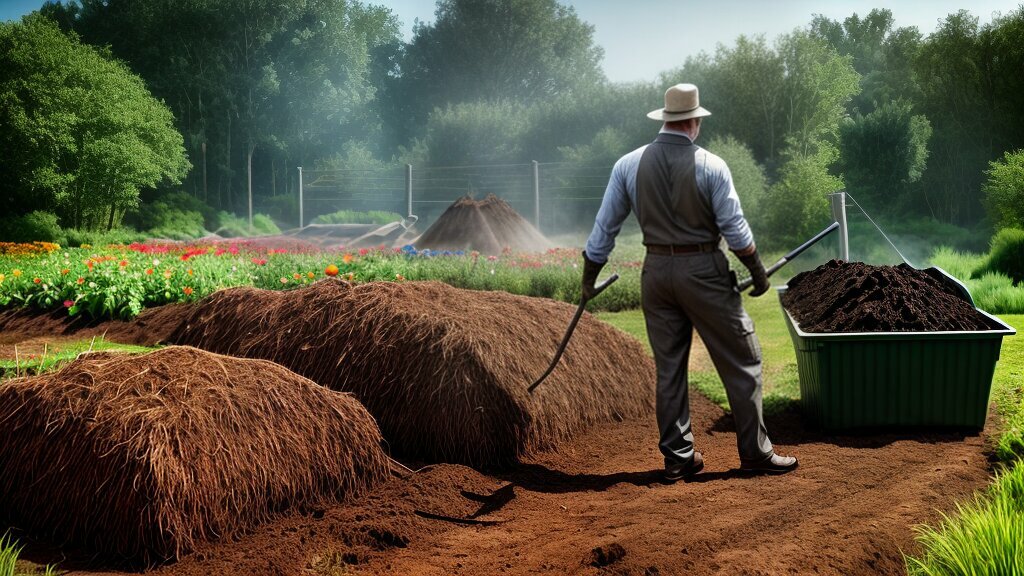
Composting Best Practices
To maintain a healthy and odor-free compost pile, there are several best practices that you should follow:
- Layering: Alternate layers of brown materials (like leaves and branches) and green materials (like food scraps and grass clippings) to maintain a healthy carbon-to-nitrogen ratio.
- Moisture: Keep your compost pile moist, but not overly wet. Aim for 40-60% moisture content.
- Aeration: Regularly turn your compost pile to maintain proper oxygen levels and prevent odors from forming.
- Temperature: Keep your compost pile between 110-160°F to promote the growth of beneficial bacteria and microorganisms that break down the materials.
- Materials: Be mindful of what you add to your compost pile. Avoid adding meat, dairy, and oils, as they can attract pests and create odors. Stick to plant-based materials and yard waste.
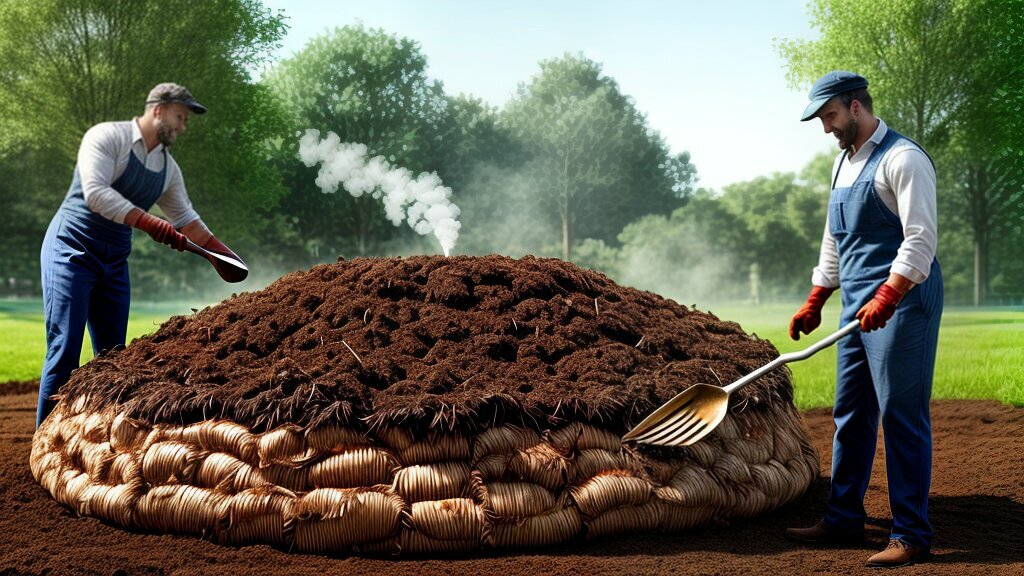
Following these best practices will ensure that your compost pile remains healthy and odor-free, and produces high-quality compost for your garden.
Composting Troubleshooting
If you’re experiencing persistent compost odors, it may be indicative of underlying issues with your compost pile. Here are some common problems and troubleshooting tips:
1. Excessive Moisture
Too much water in your compost pile can lead to anaerobic conditions and bad smells. If you notice a strong, sour odor, try turning the pile to improve aeration and add dry materials like leaves or sawdust to absorb excess moisture.
2. Lack of Oxygen
Composting is an aerobic process, meaning it requires oxygen to function properly. If your pile is too compacted or dense, it may be lacking the necessary airflow. Make sure to turn your compost regularly to promote oxygenation and avoid adding large clumps of material that can impede air circulation.
3. Improper Materials
Not all materials are created equal when it comes to composting. Certain items like meats, dairy products, and oils can produce strong odors and attract pests. Make sure to stick to compost-friendly materials like fruits, vegetables, yard waste, and coffee grounds and avoid anything that may be contaminated or unprocessed.
By addressing these potential issues and following composting best practices, you can effectively manage and eliminate unpleasant smells in your compost pile.
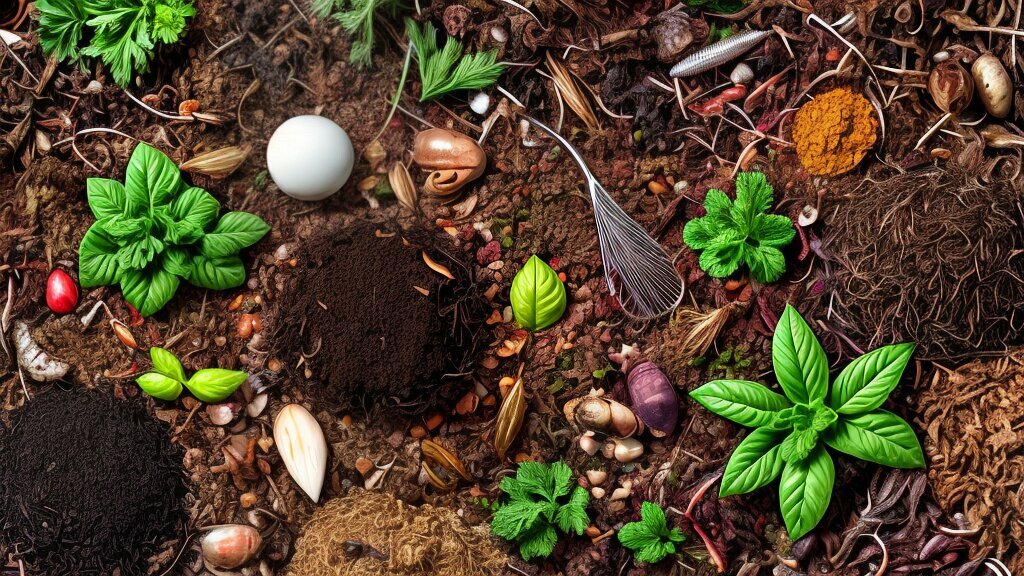
Odorless Composting Alternatives
If you’re looking for odor-free composting alternatives, there are a few options available. One popular method is vermicomposting, which uses earthworms to break down organic materials. This process produces little to no odor and can be done indoors, making it ideal for those with limited outdoor space.
Another option is bokashi composting, which uses a special mix of microorganisms to ferment food waste. This method is also odorless and can be done indoors. However, it requires a bokashi bin and some additional setup.
Both vermicomposting and bokashi composting are great options for those who want to compost but are sensitive to smells. Additionally, they both produce a nutrient-rich soil amendment that can be used in your garden.
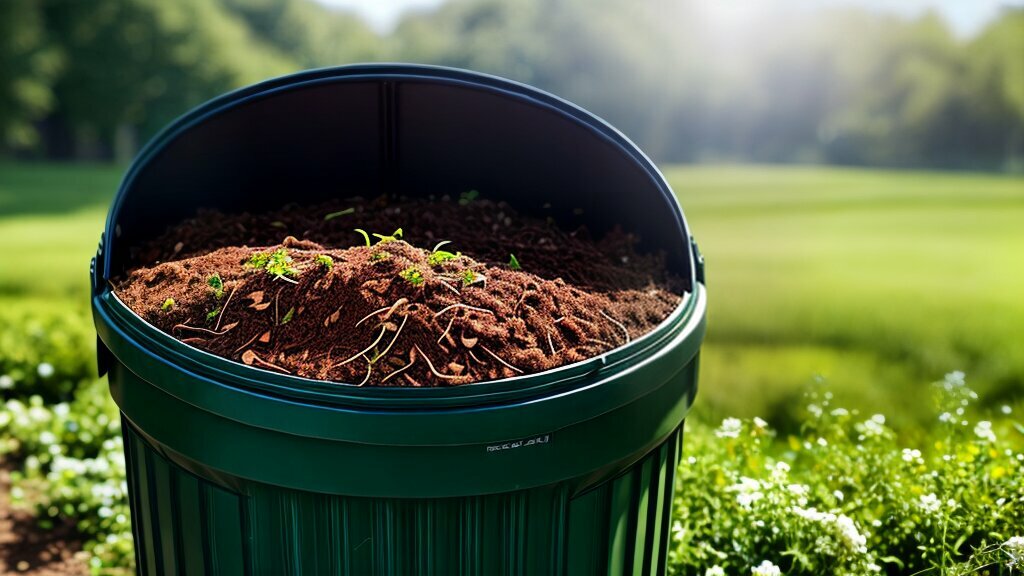
Image source: seowriting.ai
Conclusion
Congratulations, you are now equipped with the knowledge to manage compost odors effectively! By understanding the natural decomposition process and the impact of different materials on composting, you can distinguish between normal and abnormal odors. Using strategies like adjusting the carbon-to-nitrogen ratio, proper aeration, and troubleshooting potential problems, you can reduce and eliminate unpleasant smells from your compost pile.
Remember to follow composting best practices such as proper layering, moisture control, and temperature management to ensure healthy and odor-free compost. But if you still find composting to be a hassle, don’t worry! There are alternative methods like vermicomposting and bokashi composting that can minimize or eliminate odors altogether.
Incorporating these tips and techniques will not only help you achieve successful composting but also contribute to a healthier environment for your garden and beyond.

